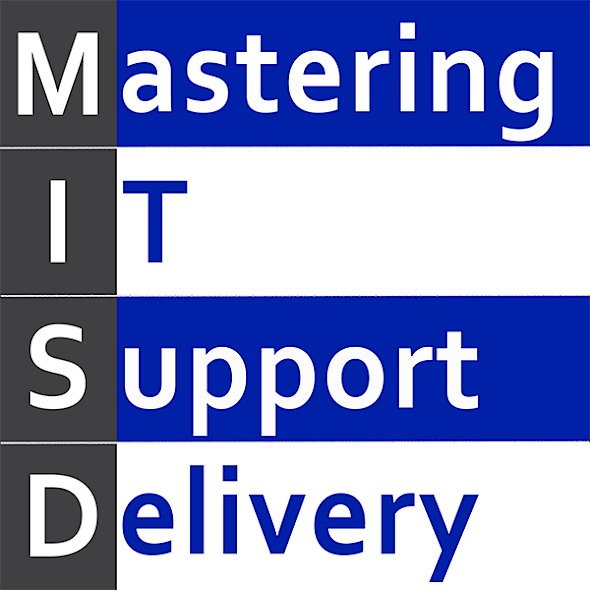The MISD Curriculum consists of several modules, most commonly delivered in four courses:
Operational Manager: for leaders of technical workgroups including helpdesk, servicedesk, all second line, and what are sometimes known as ‘third’ line functions; how to manage and co-ordinate demands and resources.
Aspiring Manager: for technicians being promoted to positions of workgroup responsibility and needing the vital shift in mindset to lift their thinking from a technical-diagnostic, to a workgroup-analytical perspective.
Foundation and Operative: essentially, for the non-managerial staff member, what is expected of the IT Support professional; how to succeed in an MISD support environment; also for those coming into IT Support, or requiring an understanding of key IT support concepts; for operatives to be prepared for the relationship with their host business, be that in internal or external support and the differences between those two environments.
Support Strategy Manager setting support strategy, designing service product portfolios, bridging between support operations and the business, turning IT Support from its typical organic and disorganised state into the structured and professional service the business actually relies on.

MISD recognises that the way to successful, consistent support is the proper management of the resources producing that service. For that reason, MISD recommends starting with the heads of the various technical groups in IT. This involves all technical groups, not just the ones obviously providing support, such as Service Desk and Desktop Support.
All technical workgroups have a support role of some sort, because their specialist skills and authorities will be called upon sooner or later, whether they be comms or AV, networks or development too. But most importantly, all IT workgroups face the challenge of having to juggle at least two types of demands, namely reactive and proactive; how to continue with projects and systems maintenance while being interrupted by Service Desk assignments. This is the orchestration of resources to be able to meet all demands on the workgroup, and so that everything gets done and nothing impedes anything else; while keeping the group a rewarding and gratifying place to work.

These imperatives are the reason that the Operational Manager Certificate is the core of MISD, and for most organisations, the place to start. Get your IT technical workgroup heads – all of them – certified in leading a professional IT department or function.
For technicians on the cusp of promotion to a leadership role, or team leaders reporting to the Operational Manager, the Aspiring Manager Certificate is essential mental preparation for the starkly different perspectives that transition necessitates.
These trained, professional managers will have new expectations on their staff. The science they have learned, enabling them to make properly informed management decisions, will lead to a more directed and more purposeful approach to service provision. What is needed now is staff who understand this professionalism, to make it easier to realise the manager’s purpose. It is time to show the staff how to succeed in the MISD environment by giving them appropriate knowledge and skillsets. This is the purpose of the Foundation and Operative Certificate. Train the managers – train the staff to work with the managers.
With the practicalities of high-quality support now dealt with, it is time to look at the bigger picture. Typically, organisations tend to try to get by without an IT Support strategy. This carries risks of uninformed management decision-making, waste, ineffective resource deployment, duplication and so on. There is a strategic reason for the existence of any workgroup, any protocol, any service, any given level of staffing, any structure. The Support Strategy Manager Certificate is the next step, to enable a longer term approach to professional support delivery across the whole of IT.
MISD can be viewed another way as providing a career path for the IT Support professional.To see that, we can view the certificates in a different order.
As an industry, IT is notorious for its neglect of the vital skills it needs of its first line, namely that of taking account that it is the impeded user, not the machine, that has the problem. IT Support staff must deal with people. This skill is also vital in the management ranks, but typically, there is no formal route to management from the first line – we can see this in the frequency with which contractors or outsourcing are used on the first line. Customer-facing skillsets are often treated, erroneously, as disposable, while technical skills are rewarded.
The Foundation and Operative course, the first step in IT Support professionalism, recognises the human aspect of IT Support, in acknowledgement that this awareness will also be needed later in the career.
The next step is Aspiring Manager. This is a recognition of a common truth about IT. As an industry, we must hire and reward technical skills because of the nature of our business. However, the risk of an imbalance towards technical ability, is that when the time comes to appoint a workgroup leader, only diagnostically-minded, reactively-schooled technicians are available.
For the promoted technician to succeed as a manager, we must first ensure a managerial mindset. If that shift is not made, there is a very real and universally observed risk that the workgroup leader will not lead at all – and instead simply remain as a reactive technician, just like his or her peers, yet paid a management salary. Not only does such a workgroup now not have a leader and orchestrator of its demands and resources, it also has a potential source of division and resentment. Its function may not be fulfilled due to the absence of leadership; and its cohesion may become less likely because the ‘manager’ does not know how his or her behaviours must differ starkly for the promotion to be meaningful.
‘Aspiring Manager‘ is designed to obviate this risk, by inculcating into the promoted technician the basic philosophy of management. This course raises the perspective from ‘fixing a technical problem’ to running a machine that fixes hundreds of technical problems. From doing as your job description insists, to determining how a whole department should conduct itself. From reacting to an individual demand, to planning a throughput policy. The people skills the technician may have developed on the first line are now given a vehicle and even become a career enhancement. This qualification is a prerequisite of the next career step.
Moving on to Operational Manager, here the philosophical basis of management is now given the tools to express itself. These are the how-to instructions of leading a team, orchestrating resources, developing skillsets, developing procedures, understanding dependencies, allying with other departments in the support machine.
At Support Strategy Manager, we no longer lead a team of operatives, but one of workgroup heads. Here the strategic decisions are made, such as which workgroups even need to be called into existence, and what their mission must be. In many companies, IT Support does not exist as a function in its own right – yet the users see it as IT’s primary purpose.
The common IT approach to providing Support is largely organic. By default, IT has groups of technicians, each specialising in given technologies. We front these with a universal call centre that has no influence over any of them, but must commission work from all of them. And when the call centre assigns a support request, often these otherwise-tasked technical groups deal with it when it is convenient to them (for typically, there is no strategy to insist otherwise). This is regardless of the huge, unmanaged, consequent impact on user and business productivity.
Under MISD, the Strategy Manager determines the IT Support strategy the business needs. The design of the service is considered and deliberate, not just an accident of organisation and technical clustering.
MISD-L1: Foundation & Operative | £1,095View Details |
MISD-L2: Aspiring Manager | £795View Details |
MISD-L3: Operational Manager | £1,095View Details |
MISD-L4: Strategy Manager | £1,395View Details |